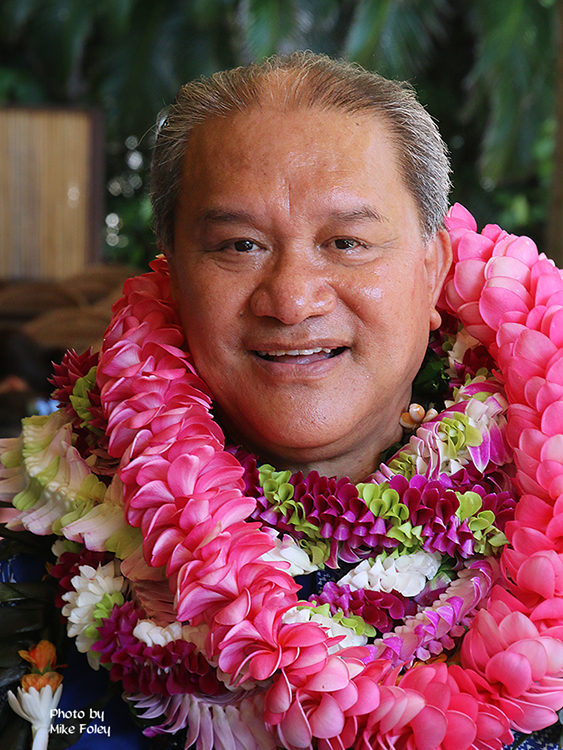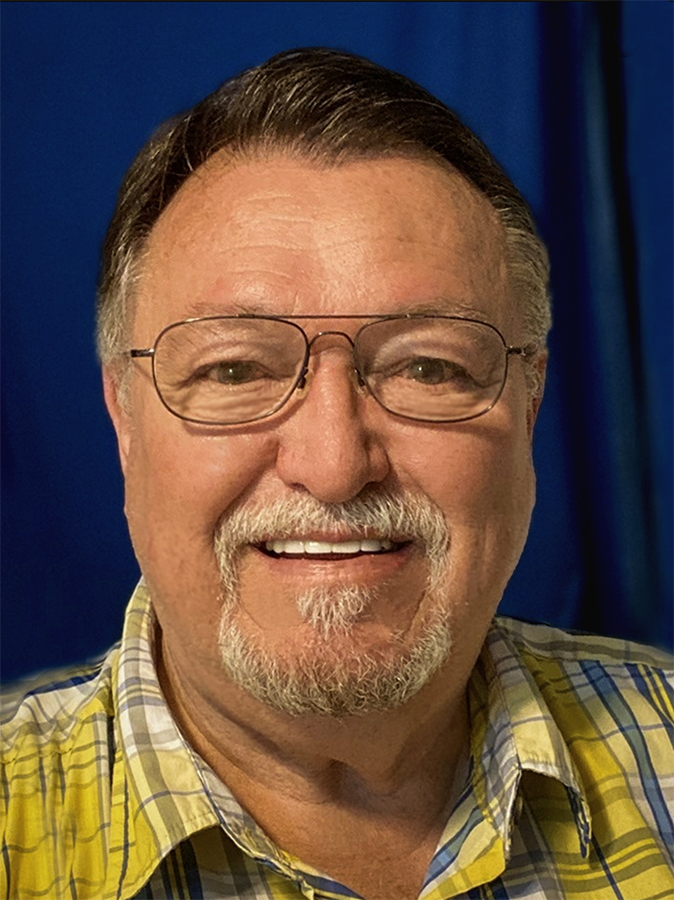
[Reprinted from the PCC’s blog, July 2019; story and photo by Mike Foley]
The Polynesian Cultural Center has hosted thousands of VIPs since we opened in 1963 — kings, queens, presidents, diplomats, dignitaries, movie stars, and sports celebrities; church and government leaders, business executives, military leaders, and many more.
And we’ve been very fortunate
over the past approximately 20 of those years to have had the perfect “Mr. Aloha” greet and escort those guests — Robert “Bobby” Akoi, one of our most senior employees who “graduated” from the Polynesian Cultural Center on July 12, 2019, when he retired after serving here for a total of 42 years.

A Hawaiian originally from Keaukaha (near Hilo) on the Big Island, Akoi enrolled at BYU–Hawaii in the 1970s where he played on the men’s volleyball team and won All-American honors. He performed with the university’s traveling troupe; and as with thousands of other BYUH students, he also worked part-time at the Center as a dancer, musician, and — after serving as a Latter-day Saint missionary in Japan — as a Japanese-speaking guide. Akoi graduated from BYUH in 1980 with a degree in travel industry management, and after working as a music resource teacher back in Keaukaha for several years, the Center hired him to work full-time in 1983.
At the beginning of his full-time years here, Akoi worked in the Hawaiian and former Marquesan Villages, the Islands administration office, as a corporate trainer, and in other positions. On the side, he sang professionally in Waikiki and is widely known locally as a member of the “singing bishops” quartet — along with fellow Hawaiian PCC retirees Cy Bridges, Harry Brown and his brother, Jay Akoi (each of whom has served as voluntary bishops of local Latter-day Saint congregations — twice, in Bobby’s case).
Learning from the master: But it was the late Tausilinu’u “Uncle David” Hannemann, for many earlier years the quintessential host for PCC’s VIP guests who started Akoi on the path to outstanding Polynesian protocol at the Center.
“He taught me five critical components about hosting VIPs,” Akoi recalled. They include appropriate greetings with leis and other special arrangements — including cultural protocol in the case of island leaders; a selection of gifts from the PCC; special feasting, of course; “and conversational do’s and don’ts — what we should say and how we should act around these guests.”
But Hannemann retired in 1995 to voluntarily serve as president of the Laie Hawaii Temple, and Akoi was “up,” so to speak, in time to coordinate the visit of Gordon B. Hinckley, worldwide president of The Church of Jesus Christ of Latter-day Saints (which founded the Cultural Center and nearby BYU-Hawaii). He spent several days in Laie for the PCC’s 40th anniversary.
“I remembered how terrified I was,” Akoi admitted.” I prayed hard the night before his visit and told myself, don’t say anything. Let the president do all the talking. Just smile BIG the whole time.”
Akoi’s plan worked well — except for during a special luncheon when President Hinckley asked about the PCC’s optional Laie Tour in conjunction with the Laie Temple Visitors Center.
“I’m so glad I had reviewed the Visitors’ Center attendance figures a couple of days before,” Akoi said. “I had learned to always be prepared for who is coming. Do a background check on their family, areas of responsibility, what foods perhaps they cannot eat, allergies to lei flowers, and so forth. Also, depending on the VIP, to stay away from political and religious conversation. Other than that, protocol is purely common-sense stuff.”
Memorable VIP visitors: Asked if any particular VIP visitors stick out in his mind, Akoi listed several:
■ When a delegation from the People’s Republic of China Religious Research Center came to the PCC about 10 years ago on the last full day of a visit to Latter-day Saint Church headquarters in Salt Lake City, Utah, he recalled.
“I remember how happy they were the whole day, smiling and cheering in every village. At a special dinner that evening in the Samoan chief’s house, their director said he had already read two of our scriptural books. He said that you people have the same beliefs as China. That is great to see. We believe in families! Everyone at the dinner were touched by the aloha spirit. As they departed the next day, all ten of them had tears streaming down their faces like they didn’t want to go home. We knew then we did the best we could.”
■ Another special visitor from the People’s Republic of China, Qizhen Zhu, former Chinese Ambassador to the U.S., also recognized “the spirit of aloha” at the Polynesian Cultural Center. He said, “[It is] the spirit of love, the spirit of mutual understanding, the spirit of living in harmony and peace. This is something I think the Polynesian Cultural Center is now clearly manifesting and the effect of that impact will go far beyond the Center itself.”
■ The late U.S. Supreme Court Justice Antonin Scalia sent the following thank-you note: “Many thanks for the elegant and stimulating luncheon, and for the red-carpet tour of the Polynesian Cultural Center. We had a wonderful time — and no small part of it was getting to meet some of the participants (student and nonstudent) who make the Center such a dynamic success. May it continue to prosper.”
■ Akoi reported he was also impressed when two-time Academy Award-winning movie star Anthony Quinn told his young daughter, who had freely grabbed some dolls and toys from the gift shop aisles, “I want you to put all those toys back. You’ll have to earn them.”
“My respect for him went up a hundred points. I knew he had the money to get it for her, but it was the principle he taught her and me that stuck with me throughout the years.”
PCC colleagues praise ‘Uncle Bobby’: Seamus Fitzgerald, a former Maori cultural ambassador who then worked in Human Resources, presented “Uncle Bobby” with a toki — a traditional adze or axe that “today is a symbol of building relationships, of building people, of building character.” He also thanked the Akoi family “for sharing your dad, your ‘papa’ with us.”
Eric Workman, PCC senior vice president of marketing, praised the style and dignity with which Akoi treated so many people. “Bobby, we will do our best to keep the aloha that you have presented so wonderfully over so many decades. We love you and will remember your examples.”
PCC Tongan Village manager Alamoti Taumoepeau presented Akoi with an ike tool, the wooden mallet Tongans use to flatten softened bark into tapa cloth. “In many of our cultural practices, the ike is a symbol of life and vitality,” Taumoepeau said. For example, the grooves in the mallet represent “the many people we come into contact with in our lives — like the many people Bobby has influenced and shaped like he has mine.”
Delsa Atoa Moe, speaking on behalf of PCC president and CEO Alfred Grace, who was off-island, recalled she was assigned to present leis to another Latter-day Saint VIP. “He came out of the van and bypassed me completely, going straight to Bobby. They talked story, discussed how’s the family, and I just stood there. It was clear to me the most important person there to greet him was long-time friend Bobby Akoi.”
“VIPs who come frequently to PCC, they call him directly,” Moe continued. “That’s how strong his relationships are. This was not just a job to Bobby: He truly loves the people he worked with — and not just the VIPs and heads of state, but even the student workers.”
Akoi’s ‘graduation’ send-offs: Later that evening the Polynesian Cultural Center hosted Akoi at another “graduation” party in the Hale Aloha venue, again showering him with VIP treatment, a feast, more accolades and gifts.
In his response during the morning event, Akoi thanked his wife, Hiromi. “She has supported and encouraged me throughout the years. I’m grateful for my children, too. I know that at times they have sacrificed without having a dad at their activities because my job often took me from mornings until after the night show.”
Akoi also recognized his mother, Rhea Akoi, 92, who came from Hilo for his retirement celebration. “It’s a miracle that she’s here,” he said. “All my siblings are also here today.”
He added he and his wife plan to do some traveling during the first year of his retirement, starting by visiting family in Asia and on the US mainland; “and we plan on serving a Latter-day Saint senior mission in our second year of retirement.”
Perhaps at the PCC? Aloha, Bobby.
— Mike Foley

